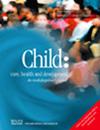Involvement of Fathers and Siblings in Home Rehabilitation Programmes of Children With Neuro-Developmental Delay: Insights From Rehabilitation Professionals in Bulawayo, Zimbabwe
Abstract
Background
Neuro-developmental delays (NDDs) present significant challenges for children and families, especially in low- and middle-income countries (LMICs). Full family participation in home rehabilitation programmes is essential for optimal functional outcomes. However, the involvement of fathers and siblings is suboptimal and underexplored. This study investigates the perspectives of rehabilitation professionals on the involvement of fathers and/or siblings in home rehabilitation programmes for children with NDD in Bulawayo, Zimbabwe.
Methods
A qualitative exploratory study was conducted. Data were collected through focus group discussions (FGDs) with 18 rehabilitation professionals. The FGDs were transcribed verbatim, coded, and thematically analysed.
Results
Rehabilitation professionals highlighted the critical role of fathers and siblings in home rehabilitation; noting fathers' emotional support and provision of financial stability and siblings' contributions to social interactions and play therapy. Barriers to involvement included cultural norms and time constraints for fathers, while siblings faced challenges such as limited age-appropriate understanding and the emotional burden of coping with the caregiving role.
Conclusion
According to rehabilitation professionals, involving fathers and siblings seems important for successful home rehabilitation of children with NDD. Addressing cultural and practical barriers to participation requires context-specific strategies, including culturally sensitive community outreach programmes and targeted interventions to promote family-centred care. Such efforts could help overcome these barriers, fostering greater participation of fathers and siblings and enhancing the effectiveness of home rehabilitation within the local context.


 求助内容:
求助内容: 应助结果提醒方式:
应助结果提醒方式:


